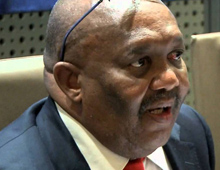Harroon Aziz
The institution of the family as a repository of values constitutes the foundation of nationhood. A nation’s sense of security, stability, and belonging replicates itself as that of the family.
South Africa in its twenty-five years of democracy is carrying 106 years of pain that dates back to the 1913 Land Act. To force male peasants from their settled family life and drive them into deep-level gold mines apartheid expropriated 87% of their land without compensation and legally compelled them to pay poll tax in cash on the pain of suffering imprisonment.
The reconstruction of the family around economic redistributive justice and through education is a historical imperative. Let’s remove the cataract vision of a rainbow nation and see the cruel reality.
The evil migratory labour system, which still subsists for over a century in the SADC region, virtually destroyed African family life. Africans resisted the destruction of their traditional family values by reluctantly adapting to the demands of apartheid. They developed the extended family system that straddled urban and rural areas. They conserved their core family values in spite of poor communications, poverty, oppression, and exploitation. These values found refuge in the simple demeanour of rural and urban women, who provided moral and material support to children, youth, and men. This was true women empowerment, transmitting and devolving humane values as the core of civilisation.
In the headiness of facile political expectations, let us pause and examine from where the family has emerged in order to move forward in nation-building.
It was a racist social necessity to destroy the African family as the basic unit of political resistance to it. It was around meals that its evils were discussed and national consciousness raised. The family units had to be prevented from adding up into a nation so that ordinary everyday experiences were not ideologically consolidated into a revolutionary African nationalism. Family units had proved to be places of refuge for cultural and political values. Discussions of ordinary events became discussions of oppression and exploitation. Family discussions became community discussions, which became national dialogue, discourse, and acts of national resistance.
The institution of the family as a repository of values constitutes the foundation of nationhood. A nation’s sense of security, stability, and belonging replicates itself as that of the family.
The family takes its care of the aged, disabled, infirm and sick as its social responsibility. The group treats all children as its own and takes special care of them.
Many lessons can be learnt from the ways children innocently play with one another. They choose their friends on the basis of their personal values, attitudes, and needs. Their needs are emotional and material.
The faith communities are in the unique position of dealing with the emotions and feelings of their members intimately. They should increase their roles in healing emotional wounds, reversing social symptoms, and fostering reconciliation.
Patriotism is much more than raising national flags, singing national anthems, and holding public displays on public holidays, special occasions, and military parades. Ordinary citizens have their own unique and non-pompous ways of living out their daily patriotism. Wherever they live, they allow that piece of land as national territory to live within them, in security and peace.
The core of patriotism is the land, around, which revolves economic redistributive justice. But when people lack land and justice their patriotism is weakened and they communicate their social discontent and political frustration publicly. Students even storm the Bastille (parliament). Inept political leaders react with live ammunitions.
Patriotism should seek unity and celebrate diversity
There is a need to learn the skills of diversity management at schools, universities, faith institutions, workplaces, sports, and in communities. It recognizes similarities and acknowledges differences. It builds friendship before competition. Some of the elements of diversity are geographic locations of people, cultures, genders, education, personal styles, beliefs, abilities, and languages.
Multiple identities, cultures, and values impel family members to regulate their conduct within and outside the family. Nationhood guarantees citizenship and offers a sense of belonging. The daily singing of the national anthem and the raising of the national flag at all schools and compulsory military service for youth can reinforce the sense of nationhood.
A nation’s diversity of ethnicities, cultures, languages, religions, customs, mores, traditions, races, sexes, social groups, politics, economics and ideologies determine the content of nationhood. They enrich nationhood with unique colours, sounds, smells, tastes, and touches. Nationhood aims for maximum inclusivity, which promotes peace, understanding, justice, and co-operation.
National consciousness is a meeting of the diversity of minds and it is rooted in historical processes. It constitutes political, social, cultural, economic, historical, artistic, scientific, spiritual, and philosophical ideas. It is a special form of mind culture, which is utilised politically. In spite of its ideological conflicts, it seeks national unity and reconciliation.
For the sake of nation-building, there are two historical imperatives: the creation of a cognitive-spiritual education model and the creation of a strategy for the deracialization of the human mind.










